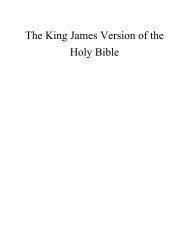Free End Times Book (pdf).. - Rapture Notes
Free End Times Book (pdf).. - Rapture Notes
Free End Times Book (pdf).. - Rapture Notes
You also want an ePaper? Increase the reach of your titles
YUMPU automatically turns print PDFs into web optimized ePapers that Google loves.
The Feast of Unleavened Bread -- Fifteenth of Nisan<br />
This feast was to be celebrated the day after Passover.<br />
Then Moses said to the people, "Commemorate this day, the day you came out of Egypt, out of the land of<br />
slavery, because the LORD brought you out of it with a mighty hand. Eat nothing containing yeast. (Exodus<br />
13:3)<br />
This feast marked the beginning of seven days of eating unleavened bread. In Jesus' time, it appears that the Jews<br />
had combined the Passover and this first day of unleavened bread.<br />
On the first day of the Feast of Unleavened Bread, when it was customary to sacrifice the Passover lamb, Jesus'<br />
disciples asked him, "Where do you want us to go and make preparations for you to eat the Passover?" (Mark 14:12)<br />
Separation from yeast is symbolic of purification from sin. It symbolizes the purification of Christ's disciples. This,<br />
of course is the result of His death: believers are delivered from the penalty and power of sin.<br />
The Feast of Firstfruits -- Seventeenth of Nisan<br />
Leviticus 23:9-14<br />
This feast was prescribed in Leviticus 23:9-14, while Israel was still wandering in the wilderness, but it was not to<br />
be celebrated until they entered the land. When they did finally enter the Promised Land, Joshua 5 records the<br />
sequence of events.<br />
On the evening of the fourteenth day of the month, while camped at Gilgal on the plains of Jericho, the Israelites<br />
celebrated the Passover.<br />
The day after the Passover, that very day, they ate some of the produce of the land: unleavened bread and<br />
roasted grain.<br />
The manna stopped the day after they ate this food from the land; there was no longer any manna for the<br />
Israelites, but that year they ate of the produce of Canaan. (Joshua 5:10-12)<br />
On the fourteenth day of the month they celebrated the Passover. On the next day, the fifteenth, they ate "some of<br />
the produce of the land." The word for "produce" is properly translated "old corn" in the King James version<br />
because the Hebrew word used was `abuwr, which literally means "passed" or "kept over." The word was used only<br />
of stored grain.<br />
On the next day, the sixteenth day of the month, Manna was given for the last time. The next day, the 17th, would<br />
have been their first day of food from the new land. The word "produce" in this verse is different from the word used<br />
earlier. It is the Hebrew tebuw'ah, meaning "income," or "fruit."<br />
All of this speaks of their new life in the Promised Land.<br />
The resurrection of Jesus was on the third day. It was, therefore, symbolized by this feast. The concept of the "first<br />
fruits" is most appropriate since, as Paul explains,<br />
But Christ has indeed been raised from the dead, the firstfruits of those who have fallen asleep. For since death came<br />
through a man, the resurrection of the dead comes also through a man. For as in Adam all die, so in Christ all will be<br />
made alive. But each in his own turn: Christ, the firstfruits; then, when he comes, those who belong to him. (1<br />
Corinthians 15:20-23)<br />
As Matthew Henry writes, "It is very observable that our Lord Jesus rose from the dead on the very day that the<br />
first-fruits were offered, to show that he was the substance of this shadow."<br />
Thy Kingdom Come, Thy Will be Done… 23



